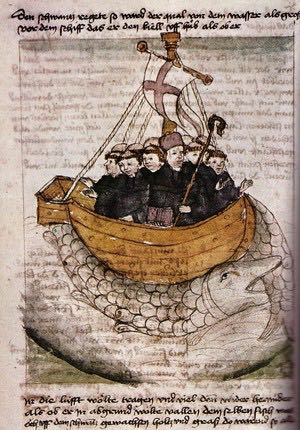 by Lilly Lewin —
by Lilly Lewin —
The Celtic Christians prayed along the way…they prayed as they got up in the morning and rekindled the fire, they prayed as they went out the door to work, they prayed for family members as they cleaned up their homes, they prayed for their work as they walked down the lanes to the fields.
I find this comforting as there are so many mundane tasks that have to be done day in, and day out. The prayers of the Celtic Christians have inspired to me to pray along the way too. To pray using everyday things, and allow every day tasks and chores to be prayer times.
So for Freerange Friday we are going to pray with our laundry!
Missing socks…
Missing dreams…
Maybe your dreams have been lost like a sock in a dryer…
Maybe you cannot find it’s mate
Or maybe your dreams have become shrunk or wrinkled?
Maybe they have been sitting too long wet and still in the bin
and now they stink…
Like old cheese.
What are your dreams with God?
What are God’s dreams for you?
Have you asked God lately?
Take some time,
Pray about this.
Dream Big.
As you sort, fold or wash your socks, let your dreams grow.
Talk to God about your dreams, your dreams that may have holes in them, or gotten lost or separated along the way.
Dreams that are worn thin and need new life.
Dream Big with God about your life!
Ask God to show you the dreams God has for you as you wash &fold socks.
Clothes prayers:
How’s your spiritual life at the moment?
Is it in dirty piles on the floor? Or heaped in a corner ?
Is it neatly folded and put away so no one can see it?
Is like your favorite T-shirt and pair of jeans?
Or is it more like a prom dress put away for a one time gig?
Is it well-worn?
Or does it still have on the tags?
Is it a hand me down faith or have you received it on your own?
Does it need mending?
Does it need to be re-sized because you’ve out grown it or lost some weight?
What garment, what piece of clothing represents your spiritual life right now?
Take it out of the pile, or the drawer or the closet and hang it up where you can see it each day…allow God to speak to you through this garment or item.
Is there a garment or item of clothing that you’d like to represent your new life in God? Place that out too or cut out a picture of this item and hang it up where you can see it daily. Allow the Holy Spirit to speak to you through the piles in your room, the laundry basket and even your wardrobe or closet.
Praying for others:
If you do laundry for other people….like your family or roommates,
Pray for them as you wash their clothes or as you fold them. And if you have kids help you wash and fold, get them to pray with you!
Ask Jesus to warm their hearts, to clean any spots or soiled areas that are troubling them. To help them feel clean and whole. To be refreshed with the Spirit. What else comes to mind?
If you do laundry at a laundromat, pray for the people you see around you….
Consider their lives…
What are their needs?
Ask Jesus to touch their lives in ways that make him real to them.
Take along some extra Quarters to give to someone who might need help with their laundry, or help someone carry out a load or two.
Ask Jesus to help you see with new eyes the needs around you.
If you use a dry cleaner, get to know them.
Too often service providers don’t get treated with honor or respect.
Begin to pray for them and their business.
Jesus, thank you that you are with us in the day to day pieces of living.
Thank you for the power to sort through the piles that clutter our lives.
Thank you for seeing the spots and loving us even with our stains.
Thank you that you already know our dirty laundry, the stuff we try so hard to hide away, and you long to set us free.
Thank you for your promise to wash us and make us whiter than snow.
Help us to know this. Help us to receive this!
Help us to receive your love and your cleansing forgiveness.
And Help us Lord to share your cleansing love and forgiveness with those around us.
AMEN
freerangeworship.com
….A CALL TO RAD WHOLE LIFE FAITH FOR TIMES LIKE THESE
By Tom Sine
As we race into a future changing at WARP SPEED we need to invite the Spirit of God to ignite our imaginations to create whole new forms of LIFEMAKING, CHANGEMAKING and CHURCHMAKING to engage new challenges and opportunities of changing times.
We have, in earlier posts, celebrated the compassion and creativity of the millennial generation numbers of whom are creating new forms of changemaking enabling some churches to move from token handouts to creating social enterprises to empower their neighbors don’t need handouts.
As I stated in my last post this generation also recognizes climate change is real and poses a real threat to both God’s good creation and to our children and grandchildren. Many of them are in the front of the movement to restore God’s good creation. They are also challenging those of us in all generations to: Live Like We Give A Damn! Will you join them?
Since we live in a world changing at WARP SPEED we can no longer continue with business as usual in both our churches and our personal lives. Let’s take a hard look at one way we need to join those who are re-imagining how to be followers of the servant Jesus in a world of accelerating change.
In a recent post I explained that many mainline churches are facing a “DEATH TSUNAMI” because while their denominations are declining at a constant 2% to 5% a year that is not the complete story.
Not only mainline churches but a growing number of evangelical churches are facing a rapid die-off in aging congregations. Since the majority of members in many of these graying in congregations are comprised of us 50 to 90 year olds these churches are likely to experience an accelerated rate of decline.
Now we are also facing a PARTICIPATION TSUNAMI. Many readers over 40 can remember when regular church attendance was Sunday morning, Sunday night and Wednesday night. Today, “regular” church attendance is once or twice a month. Time to volunteer to help those in need is down, time for prayer is down. Per capita church giving which was 3.8% in 1968. to a new low In 2015 of 2.4%. While some congregations are still flourishing individual participation rates even of these churches are still declining.
The urgent question for all church leaders is “how long can participation levels and giving levels continue to decline before numbers of our churches begin to hemorrhage and lose their essential vitality?”
Of course one of the reasons for people’s declining levels of participation is because many of us are experiencing growing pressure of our rapidly changing world on our lives and families. I suspect another factor could also be a failure of discipleship education in a number of our churches to enable us and our fellow members to live our best lives.
I find that mainline churches offer courses, like many Catholic Churches, in spiritual formation. Evangelical churches usually seem to offer courses in personal discipleship. Is it possible while these courses certainly have value that too often we seem to be content if they simply help people limp through our week? Is it possible that too often we settle for less…not go for our best?
Is it possible that Christian educators could learn from life coaches, that corporate leaders hire, how to enable follower of Jesus to seriously up our game? Is it possible that we could learn how to create more compassionate, focused, disciplined and festive lives…in the way of Jesus?
Corporate leaders often have enormous responsibility and could never carry out their roles simply limping through their week. Wouldn’t creating discipleship courses that enables us to create more purpose focused disciplined whole life followers of Jesus Christ lives be a good idea?
I got some time with my friend Dan White Jr. At the recent Inhabit Conference here is Seattle. He shared how those in the V3 network are already addressing this urgent need through what are called “Curated Conversations.” Dan explained that in these conversations they help members of their churches to define a clear sense of purpose for their lives and create a rhythm where they have time to be present to God and care for neighbors as well a time for family and their work.
Dan stated these curated conversations also help members learn how to delight in God, create community, get to know their neighbors, develop personal disciplines and create a flourishing life.
Living in a world changing at WARP SPEED, where we are witnessing declining levels of participation in many our churches, wouldn’t it be good to create our own curated conversations? Wouldn’t it be good idea to raise the bar in our discipleship courses and enable one another seek to become whole life, disciplined followers of Jesus? Wouldn’t it be a good idea to discover the new ways God can use our mustard seeds to be a difference and make a difference…in times like these?
By Talitha Fraser —
When life becomes stressful and you find yourself burdened by matters personal or political, or holding things that are going on for friends or family you might find yourself seeking out space and grace to help you get through it. I found myself reflecting recently that those spaces I seek out aren’t incidental or metaphorical but instead can be a literal expression of what I feel or need – for instance, if I want today to be a new day and start over differently I might wake at dawn to watch that new start spark. If I feel small and struggling against bigger problems than I can overcome then lighting a candle can remind me just how much light that can still cast and how warm and encouraging that light can still be. If you have been hanging out for a day to end it might feel really good to watch it finally come to a close.

The water’s edge can be a powerful place. Jesus often spoke on the water and at the water’s edge. The vastness of a beach horizon can provide a sense of scale to reflection. The tides speak to larger rhythms we all participate in as created but may not be aware of or understand. Out and in, out and in… you can breathe with it and know what is full will be emptied, and what is rushed will slow. Rivers are rich landscapes – you know that what is passing now has passed by others before you and will pass by others after you. There is something special in the biodiversity of this – at once you are not alone and also you can ask: what does the river bring here with it? What will it carry away? If there are too many things in your mind competing for attention find one small remarkable thing to focus on and marvel at it. Become present to your surroundings and observe what is there to be seen – if you’re not too sure about this you might set out for a walk with a list of things to look for: feather, seed, bud, leaf, mushroom, flower, shell… leave it where and as you found it – it is where its meant to be. In its company you might have an understanding of this yourself, made as you were meant to be.

Seek out some high hill or mountain top for the view, from this perspective matters that might seem overwhelming might become smaller and less significant in the bigger scheme of things. Getting distance, physically, mentally, spiritually can be helpful – the city becomes its skyline, street lights can become like a twinkling field of stars. From this angle things might be softer and more beautiful, we can accept and appreciate them for their form and function day to day because we know when we step back they play a part in what our life is. Sitting around a fire can be a good place for talanoa or deep listening, so much can happen around a campfire… we might share ideas, stories, resolve problems, develop or maintain relationships… when Jesus healed the bleeding woman she “told him the whole truth”. When and with whom are you doing deep sharing and deep listening? Walks in the bush can require following a path and we do not know where it leads, we don’t always know if it will go up or down, or how long it will take, will it open out to a place where we can see and get our bearings or do we just follow it from its beginning to its natural end trusting it to lead us to where we want to be never knowing more than a few metres ahead what the path looks like.

I could continue…
If you need to feel grounded take off your shoes and walk on the grass. Feel the connection between your feet and the earth.
Make and use compost and you will come to understand that nothing is a waste. A seed has to die to become a plant. Our endings are the soil of our next beginning and everything can be turned to good purpose. Today’s crap is the fertiliser of the seeds we plant tomorrow.
Join a family dinner table if you need a timeout from your own headspace. Children require of you to be present and bear witness to their wonder, play, awareness of their needs – physical, social, emotional – let’s face it, you probably won’t be able to hear the voices in your head over the noise they make, that might be a rest you need.
Look at the stars. They have been used for navigation and to find our way home since time immemorial. People in different times and in different countries have told stories using the same stars – like the Pleiades also known as Krittika and Matariki. Pull a string and the rest of the world is attached. You are not alone. You are one among many and among all those who have ever been.
Hosea 2:14 reads “Therefore, behold I will allure her, and will lead her into the wilderness: and I will speak to her heart” Be allured. Think about what you need and what grace each space speaks to your heart, that way you can be intentional about seeking out the space you need and be restored. Once you are there, present to place, pray. What insight do you gain about your circumstances from being in this place? How can you change them? Sometimes we can feel like circumstances and situations are out of our control and there’s nothing we can do but being present to them in space allows for responding creatively – how might it feel to light an extra candle? to take a flower home and put it in a vase where you can look at it daily? to invite your friends round to gather at the fire? In some small way this is making a difference, this is exercising choice This awareness can spill over as you practice it, then these will not be spaces you seek out at need but ones that you come to awareness of and welcome as they arrive in your day – at different times, by different light, in different seasons – space and grace.
ST. BRENDAN THE NAVIGATOR for Feast Day, May 16
Have you ever met someone from Christian history that has captured your imagination and has influenced your life? Like you, I too have had that experience.
About seventeen years ago, while in seminary, I became enamored with the Celtic and Anglo-Saxon saints and the idea of peregrinatio, the desire to travel to the place of one’s resurrection and to experience personal resurrection not only in heaven, but also on earth. This journey would be dependent upon Christ as their companion and guide. During the early days of my pilgrimage into Celtic Christianity, I came across the great Irish saint, Brendan the Navigator, also known as St. Brendan of Clonfert. I was smitten and I just knew I had met a soul mate through that thin veil of the ages.
There are two aspects of this saint that pulled at my heartstrings. First of all, St. Brendan seems to have been possessed with the DNA for wanderlust, like many Celtic saints both past and present. I too seem to have born with the powerful pull of wanderlust. My parents used to joke that my middle name was “go.” St. Brendan and his disciples would construct a coracle, a boat with a basket-like frame of wood, covered with animal hides softened with butter, and covered in pitch. Then these voyagers would fast and pray, clamber into their little handmade boat with St. Brendan saying as they set sail: “Is not the Lord our captain and helmsman? Then leave it to Him to direct us where He wills.”
Secondly, I have a name very similar to his, “Brenda.” I have always been more than a bit ambivalent about my name as it seemed that only 1950’s TV stars with teased and overly sprayed beehive hair had this rather unsophisticated name. Having a name derived from St. Brendan’s has provided a better appreciation for the moniker carefully chosen by my parents.
As I began to read and study more about my namesake, I discovered that Brendan was born about 484 AD to Christian parents, Findlug and Ciara in southwestern Ireland in County Kerry near Tralee. As is typical of early nativity stories about Celtic saints before their birth, his mother had a vision that the child in her womb was filled with the Spirit. On the day of his birth, Bishop Erc, who was baptized by St. Patrick, saw Brendan’s birthplace aglow with an angelic presence surrounding that place and immediately he went there to hold this very special baby. This little one was first named Mobi, but his name was changed to Braenfiend (Brendan) meaning “fair drop or white mist.”
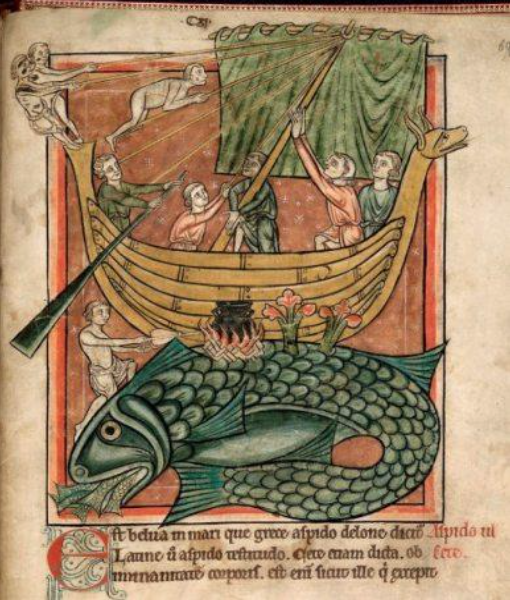
Picture of St. Brendan and his crew celebrating Easter on a whale. Whales: Anonymous after Hendrick Goltzius, Stranded Whale at Zandvoort, 1594. Harvard Art Museum, Light Outerbridge Collection, Richard Norton Memorial Fund; British Library Manuscripts Harley 3244 & 4751.
Bishop Erc at Ardfert baptized Brendan. This Bishop who was known as one of the founders of monasticism in Ireland would later become Brendan’s mentor teaching him both Latin and Hebrew. Yet as a young child, he was given by his parents to Abbess Ita of the convent of Kileedy in County Limerick to be trained and educated for about six years. Like the Druids, St. Ita taught in triads. Brendan is believed to have asked her what three things God loved best and she answered: “Faith in God with a pure heart, a simple life with a religious spirit, and generosity with love.” She also told him the three things God most detested were a scowling face, obstinacy in wrongdoing, and too great a confidence in the power of money.
Brendan had that Celtic need for travel and to explore. His Bishop Erc eventually gave him permission to leave the monastic lands, but Brendan had to promise to return so that the Bishop could ordain him. On that first journey, Brendan travelled to Skellig Michael, Arans, Strathclyde, Cumbria, and maybe even Wales.
Brendan then set up his famous monastery at Clonfert in about 559. It has been said that at one time there were 3,000 monks in residence there. He later founded other monasteries including Ardfert in Kerry, Inishdadroum in Clare, and Annaghdown in Galway where his sister Brig was the Abbess.
With that wanderlust still burning in his soul, Brendan yearned to find the Promised Land of the Saints. On this adventure he and his fellow voyagers encountered all kinds of interesting sea creatures and scary sea monsters. They even celebrated Easter on what they thought was an island, but it was a whale! They later came upon something they had never seen before, an iceberg. These Celts with a great love for God’s magnificent creation were so amazed by this gigantic ice island that they spent a whole day inspecting and measuring this phenomenon. Brendan declared, “let us inspect the wonders of God, our Maker.” It was on this journey that it is thought that Brendan and his crew even travelled to Iceland and North America, discovering them long before the Vikings or Christopher Columbus.
Adomnan, an historian and early Abbot of Iona wrote that Brendan even visited the famous St. Columba of Iona on the island of Hinba and St. Malo in Brittany. He also travelled to Brittany in France and the Orkney and Shetland Islands off of Scotland.
At the end of Brendan’s life in 577 or 578, he blessed his sister Abbess Brig and his followers, committed his spirit to God, and then died at his church at Clonfert. He is considered to be one of the Twelve Apostles of Ireland.
Perhaps you too have discovered a saint or a person in Christian history that has touched your life. You may even have a similar name to a saint that you admire. When a saint captures your imagination, pay attention to this little tug at your heart. This may be a calling into a new soulful season of your life’s pilgrimage.
Let us with great faith and a bit of Brendan’s adventuresome spirit clamber into our little coracle and ask the Spirit to blow us to places we never dreamed or imagined!
Rev. Brenda G. Warren is an ordained Christian Church (Disciples of Christ) pastor. She invites us to journey with Celtic and Anglo-Saxon saints at www. saintsbridge.org.
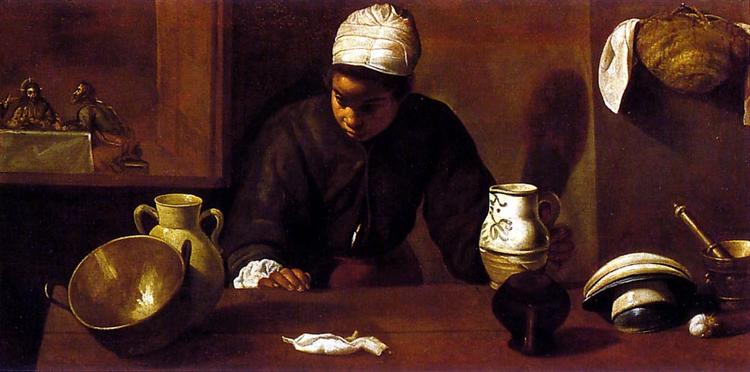
Kitchen Scene With The Supper In Emmaus Diego Velazquez (public Domain)
by Christine Sine
A couple of weeks ago our rector preached about the disciples meeting Jesus on the road to Emmaus. He began by talking about Diego Velázquez’s painting The Kitchen Maid. Here the two Emmaus disciples are vaguely seen in the background seated at the table with the Resurrected Christ. In the foreground, is a nameless servant girl, dark complexioned, obviously Middle Eastern, probably of low status, possibly a slave. Velázquez portrays her as the first in the house to recognize the risen Christ whom she is serving. What a moment! what an incredible revelation!
Some of us are quick to say “but it’s not Biblical” and it is true, there is no servant girl in the Biblical narrative but there must have been serving girls and kitchen maids. These were the women not usually noticed by men unless they were being blamed or used.
Yet I think Velázquez has it right. These are the ones to whom Jesus first appeared. There was Mary, the mother of Jesus, a young single pregnant woman who could have been stoned for her seeming indiscretion. There was Mary Magdalene whom we talked about last week, and the woman at the well that Jeannie Kendall reflected on.
The Biblical figure that comes most vividly to mind when I reflect on this painting is Mary the sister of Lazarus. She wanted to sit at Jesus feet and learn from him just as the men were able to learn, but even her sister Martha wanted to relegate her to the role of servant. (Luke 10:38-42) When Jesus says that Mary has chosen the one thing that matters he is really becoming an advocate for bringing women out of the shadows into the place of education. Basically he is saying: Mary wants to learn from me, just as the men do, that is all that really matters for both men and women.
It seems to me that the young kitchen maid represents all the women throughout history that Jesus has liberated from slavery, abuse and inequality. These women are often the first to recognize the risen Christ, yet we so often try to push them back into the places of slavery. The domination of women by men was a consequence of the fall and the brokenness of humankind. (Genesis 3:16). Yet our society and many of our churches seem to want to maintain this brokenness. Men still want to dominate women and we let it happen. From the sex trade to unequal wages, from the refusal to allow women in leadership to the lack of maternity leave, the rules are still against equality for women. Women as sex symbols still sell everything from cars to shampoo. Some even believe that because the Bible has been translated by men over most of its history, discrimination has been perpetuated in our interpretations.
I love the way The Voice translates Adam’s response to the creation of Eve in Genesis 2:23 At last, a suitable companion, a perfect partner. Bone from my bones. Flesh from my flesh. My husband says that not treating me as an equal diminishes him. Not allowing the gifts God has given me to fully develop is like cutting off one of his arms or a leg.
What Is Your Response?
This post is part of a series I felt God prompt me to write on women in the Bible and in the church. Recovering God’s perspective of freedom and equality as it relates to the relationships between men and women has been liberating for me and I know that it is time for me to speak out more strongly. Like most women in the church I am still confronted with inequality at times, but have the privilege of freedom in ways that many women will never have. I still remember the medic in the refugee camps in Thailand who said” You give me hope that one day my daughters will have the same freedom you do.”
Which scriptures come to mind when you think about God’s view of women and their place in the church? How have you been an advocate for equality? Are there ways that God might ask you too to speak out more strongly in support of those who are still pushed into the shadows?
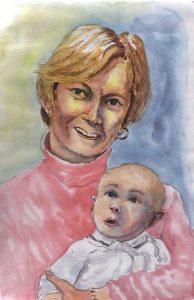 An AHA moment on Mother’s Day [illustration by Dave Baab]
An AHA moment on Mother’s Day [illustration by Dave Baab]
by Lynne Baab
The setting: the worship service on Mother’s Day a couple of decades ago.
The AHA moment: the prayer that gave permission for people to struggle on that day.
About 20 years ago on Mother’s Day, my good friend and colleague was leading the prayer time in the worship service. Over the years, I had sat through many prayers on Mother’s Day that expressed thanks to God for mothers, a good thing to do. This was the first time I heard a prayer that expressed those appropriate thanks to God, but also acknowledged that Mother’s Day is hard for some people. My friend mentioned couples who struggle with infertility or had lost a child, women who were single and wished to be married and have children, and those who had difficult relationships with their own mothers or their children.
It truly was an AHA moment for me. For various reasons I had never liked Mother’s Day very much, and here was someone naming some of my ambivalence and struggle. Her words conveyed such freedom and acceptance to me.
Right now I’m teaching an online class for Hope International University on leading communal spiritual practices. In some of our online discussion we have talked about the fact that all leaders of communal spiritual practices need to lay out the goal and structure of various practices with optimism for the great experience spiritual practices offer. However, at the same time, leaders need to affirm that people come into those practices with diverse feelings, and they will have different experiences as they engage in the practices as well.
As leaders in any setting, we have to make room for people to talk about, pray about, and think about their gratitude for the great blessings they experience, as well as the sadness, sense of loss, and unfulfilled longings they experience. Both are real. Both sets of feelings can and should be brought into God’s presence.
With respect to motherhood, I suspect most mothers have at least some mixed feelings, no matter how much they appreciate the gift of children. In the previous paragraph, I mentioned feelings of great blessing, sadness, sense of loss, and unfulfilled longings. I suspect that most mothers experience all of those at various times. I know I did when my children were still living at home. Sometimes I still do.
Many people have experienced great blessing, sadness, sense of loss, and unfulfilled longings related to their relationship (or lack thereof) with their own mother.
What does it look like in Christian spirituality to praise God for the good gifts we experience and also allow honest expression of the thoughts and emotions we consider to be negative? What does it look like to encourage thankfulness and praise, while also giving people permission to pray and talk about the struggles?
And what does it look like for someone who loves Mother’s Day to make room for those who experience the day as a mixed blessing? And vice versa?
The Psalms provide a powerful model for the movement between thanks, praise, sadness, anger, loss, and lament. I’ve been praying the Psalms for many years, and the variety of emotions in the Psalms has helped me bring my own mixed and complex emotions into God’s presence so many times.
But what about those emotions expressed in the Psalms that we’re not feeling? Someone once told me that whenever we come across an emotion in a psalm that we’re not feeling, we can pray that verse on behalf of the people around the world who are having that experience.
I wonder if we could adopt that strategy on Mother’s Day. In prayer, we can express our own emotions about the day, but we can also enter into the feelings of those who experience the day differently. The Psalms model God’s welcome of everything we feel, as well as God’s compassion for those whose experience is different from ours.
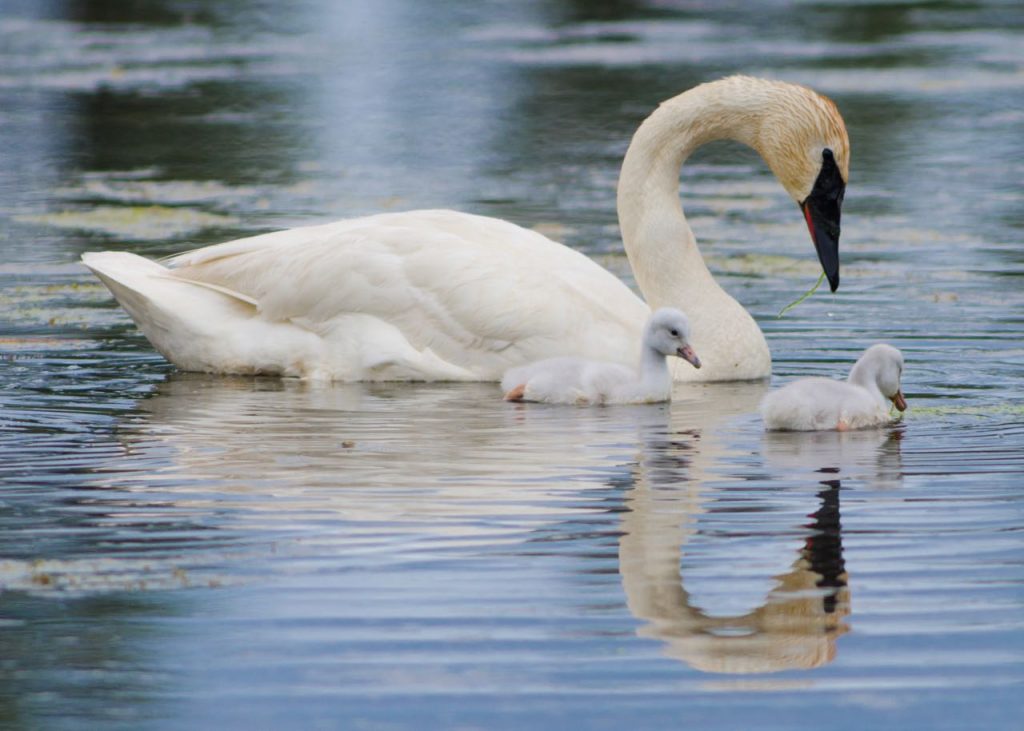
Swans Craig Goodwin http://www.craiggoodwinphoto.com/ Used with permission.
by Emma Morgan
Opening Prayer
God with a mother’s heart,
You gather us as your children.
You comfort and hold us in your warm embrace.
When we hurt your arms enfold us.
When we are afraid your wings protect us.
When we are hungry you feed us with the bread of life.
God with a mother’s heart,
Your love surrounds and supports us,
In good times and in tough,
In the midst of joy and pain,
Always and everywhere.
You will never leave nor abandon us.
God eternal and loving one,
God with a mother’s heart,
We thank you this day,
For being part of your family.
(prayer by Christine Sine)
Communion
Set up: Farmhouse style table setting eg. buttered scones, oat biscuits, a big jug of red juice, a display with eggs, fruit and vegetables in a basket.
Remember when Jesus gathered the children on his knees? (Matt 19:14)
Remember when Jesus said “How often I wanted to gather your children together, just as a hen gathers her brood under her wings.” (Luke 13:34)
Remember when Jesus said ‘Come to me.. and I will give you rest.’ (Matt 11:28)
With Jesus’ spirit close to all those who call on him, we come to Him now.
Let us read together:
Jesus we invite you this table
Stay with us
Be our guest and also our host
May we know you at this table
In the sharing of this meal.
Come and take some food and drink and hold onto it so we can enjoy it together.
Serve food and drink and play relaxing music.
Let us breathe in the goodness of this moment, the rest of Jesus in this moment.
Space for reflection.
The Lord Jesus, on the eve of His death, shared a meal with His followers.
Taking the bread, He gave thanks, broke it, and offered it to them with these words:
This is My body broken for you. Remember Me whenever you eat.
After the meal, taking the cup of wine,
He gave thanks, and offered it to them with these words:
This is My blood poured out for you, Remember Me whenever you drink.
And so, we eat and drink in memory of Jesus and His great love.
And in this simple meal
We acknowledge the living Jesus.
We celebrate the life and rest he gives us, even today.
The meal is enjoyed.
Communion liturgy taken in part from A Communion Liturgy for Palm Sunday
Blessing on all the Women in our community
A basket of chocolates is taken around to all the women and girls of the community.
We have a gift for all the women and girls in this room this mother’s day. We are blessed by all you give to this community and to the communities around you. Enjoy these treats as we pray a blessing on you.
Prayer of Blessing in honor of Women
God of Sarah and Hagar, Naomi and Ruth, Esther and Deborah,
God of Mary and Elizabeth, Mary and Martha, Mary Magdalene, Lydia,
and all the unnamed women of scripture,
as you anointed these women with the oil of faith and calling,
so anoint women everywhere.
as you blessed these women with finding the courage and strength, persistence and perseverance within them, so bless women everywhere.
as you transformed the world through the vision and work of these women,
continue to transform the world through the vision and work of good women everywhere.
From Australia to India, from Russia to Uganda, (alteration to original)
May women continue to form and build community in ways that birth justice, love and peace among us.
In gestation and through the laboring, keep them focused, strong, steadfast and unwavering.
God, bless the women who continue to work tirelessly, often unnoticed,
but full of beauty and power, for all manner of good.
Continue to make them vessels of your sustenance; instruments of your peace; an inspiration to all. Amen
(Prayer by Erin Matteson.)
As an Amazon Associate, I receive a small amount for purchases made through appropriate links.
Thank you for supporting Godspace in this way.
When referencing or quoting Godspace Light, please be sure to include the Author (Christine Sine unless otherwise noted), the Title of the article or resource, the Source link where appropriate, and ©Godspacelight.com. Thank you!




